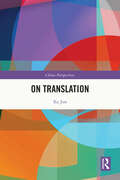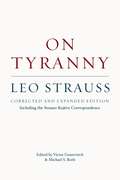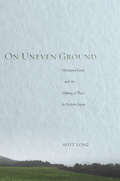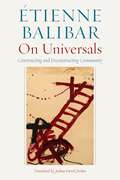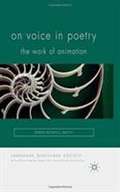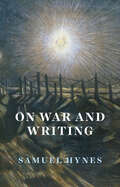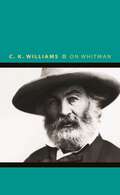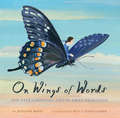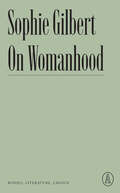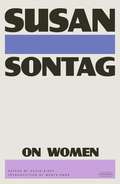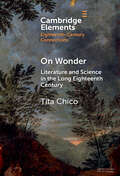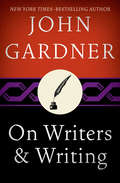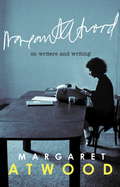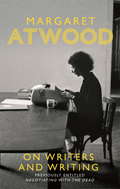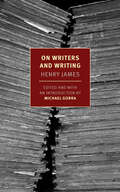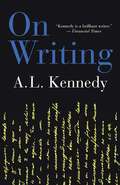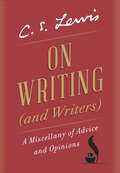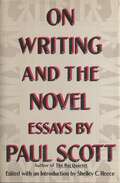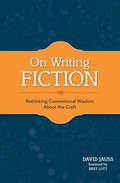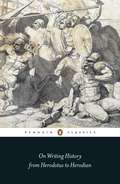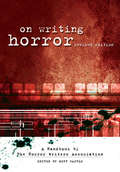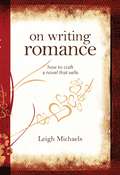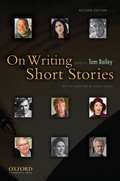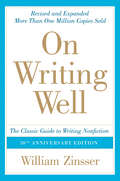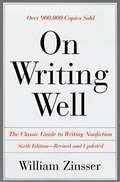- Table View
- List View
On Translation (China Perspectives)
by Xu JunThis book presents a fresh perspective on translation, exploring it as a complex process of cultural exchange involving both language and culture.The author examines the core aspects of translation, including its nature and procedures, key factors, text selection and approaches. It also examines the internal tensions and dynamics between authors, translators and readers, and the value system of translation criticism. The book also illustrates the role of culture in translation, discussing the cultural information embedded in language, the relationship between culture and meaning, the cultural interpretation of meaning and texts, the intersection of translation and cultural psychology, and the principles and methods of translation studies from a cultural perspective. By developing a systematic theoretical framework, the book aims to present translation as a complex facet of intercultural communication.This insightful work will appeal to scholars, students, translators and anyone interested in translation theory, translation studies and intercultural communication.
On Tyranny: Including the Strauss-Kojève Correspondence
by Leo StraussAn analysis of the classic Greek dialogue about absolute rule and the impassioned commentary it inspired between two philosophers.On Tyranny is Leo Strauss’s classic reading of Xenophon’s dialogue Hiero, or Tyrannicus, in which the tyrant Hiero and the poet Simonides discuss the advantages and disadvantages of exercising tyranny. Included are a translation of the dialogue from its original Greek, a critique of Strauss’s commentary by the French philosopher Alexandre Kojève, and the complete correspondence between the two.This revised and expanded edition introduces important corrections throughout and expands Strauss’s restatement of his position in light of Kojève’s commentary to bring it into conformity with the text as it was originally published in France.“On Tyranny is a complex and stimulating book with its ‘parallel dialogue’ made all the more striking since both participants take such unusual, highly provocative positions and so force readers to face substantial problems in what are often wholly unfamiliar, even shocking ways.” ―History and Theory
On Uneven Ground
by Hoyt LongThe history of literary and artistic production in modern Japan has typically centered on the literature and art of Tokyo, yet cultural activity in the country's regional cities and rural towns was no less vibrant. On Uneven Ground recovers pieces of this neglected history through the figure of Miyazawa Kenji (1896-1933). While alive, he remained a mostly unknown and unread provincial author whose experiments with narrative fiction, amateur theater, and farmer's art reveal an intense determination to reimagine and remake his native place, in the northeast of Japan, meaningful. Today, Miyazawa is one of the most recognized figures in Japan's modern literary canon. The story of his radical posthumous rise presents an opportunity to examine the larger history of how writing and other forms of artistic practice have intersected with place-based identity and the uneven geography of cultural production. The first book-length study of Miyazawa in English, On Uneven Ground centers on Miyazawa's life and writing to recreate a sense of what it was to write about and remake place from a spatially marginal position in the cultural field.
On Universals: Constructing and Deconstructing Community (Commonalities)
by Étienne BalibarMany on the Left have looked upon “universal” as a dirty word, one that signals liberalism’s failure to recognize the masculinist and Eurocentric assumptions from which it proceeds. In rejecting universalism, we have learned to reorient politics around particulars, positionalities, identities, immanence, and multiple modernities. In this book, one of our most important political philosophers builds on these critiques of the tacit exclusions of Enlightenment thought, while at the same time working to rescue and reinvent what universal claims can offer for a revolutionary politics answerable to the common.In the contemporary quarrel of universals, Balibar shows, the stakes are no less than the future of our democracies. In dialogue with such philosophers as Alain Badiou, Judith Butler, and Jacques Rancière, he meticulously investigates the paradoxical processes by which the universal is constructed and deconstructed, instituted and challenged, in modern society. With critical rigor and keen historical insight, Balibar shows that every statement and institution of the universal—such as declarations of human rights—carry an exclusionary, particularizing principle within themselves and that every universalism immediately falls prey to countervailing universalisms. Always equivocal and plural, the universal is thus a persistent site of conflict within societies and within subjects themselves.And yet, Balibar suggests, the very conflict of the universal—constituted as an ever-unfolding performative contradiction—also provides the emancipatory force needed to reinvigorate and reimagine contemporary politics and philosophy. In conversation with a range of thinkers from Marx, Freud, and Benjamin through Foucault, Derrida, and Scott, Balibar shows the power that resides not in the adoption of a single universalism but in harnessing the energies made available by claims to universality in order to establish a common answerable to difference.
On Voice in Poetry
by David Nowell SmithWhat do we mean by 'voice' in poetry? In this work, David Nowell Smith teases out the diverse meanings of 'voice', from a poem's soundworld to the rhetorical gestures through which poems speak to us, in order to embark on a philosophical exploration of the concept of voice itself.
On War and Writing
by Samuel Hynes“In our imaginations, war is the name we give to the extremes of violence in our lives, the dark dividing opposite of the connecting myth, which we call love. War enacts the great antagonisms of history, the agonies of nations; but it also offers metaphors for those other antagonisms, the private battles of our private lives, our conflicts with one another and with the world, and with ourselves.” Samuel Hynes knows war personally: he served as a Marine Corps pilot in the Pacific Theater during World War II, receiving the Distinguished Flying Cross. He has spent his life balancing two careers: pilot and professor of literature. Hynes has written a number of major works of literary criticism, as well as a war-memoir, Flights of Passage, and several books about the World Wars. His writing is sharp, lucid, and has provided some of the most expert, detailed, and empathetic accounts of a disappearing generation of fighters and writers. On War and Writing offers for the first time a selection of Hynes’s essays and introductions that explore the traditions of war writing from the twentieth century to the present. Hynes takes as a given that war itself—the battlefield uproar of actual combat—is unimaginable for those who weren’t there, yet we have never been able to turn away from it. We want to know what war is really like: for a soldier on the Somme; a submariner in the Pacific; a bomber pilot over Germany; a tank commander in the Libyan desert. To learn, we turn again and again to the memories of those who were there, and to the imaginations of those who weren’t, but are poets, or filmmakers, or painters, who give us a sense of these experiences that we can’t possibly know. The essays in this book range from the personal (Hynes’s experience working with documentary master Ken Burns, his recollections of his own days as a combat pilot) to the critical (explorations of the works of writers and artists such as Thomas Hardy, E. E. Cummings, and Cecil Day-Lewis). What we ultimately see in On War and Writing is not military history, not the plans of generals, but the feelings of war, as young men expressed them in journals and poems, and old men remembered them in later years—men like Samuel Hynes.
On Whitman (Writers on Writers #8)
by C. K. WilliamsPulitzer Prize–winning poet C. K. Williams's personal reflection on the art of Walt WhitmanIn this book, Pulitzer Prize–winning poet C. K. Williams sets aside the mass of biography and literary criticism that has accumulated around Walt Whitman and attempts to go back to Leaves of Grass as he first encountered it—to explore why Whitman's epic "continues to inspire and sometimes daunt" him. The result is a personal reassessment and appreciation of one master poet by another, as well as an unconventional and brilliant introduction to Whitman. Beautifully written and rich with insight, this is a book that refreshes our ability to see Whitman in all his power.
On Wings of Words: The Extraordinary Life of Emily Dickinson
by Jennifer BerneAn inspiring and kid-accessible biography of one of the world's most famous poets.Emily Dickinson, who famously wrote "Hope is the thing with feathers that perches in the soul," is brought to life in this moving story. In a small New England town lives Emily Dickinson, a girl in love with small things—a flower petal, a bird, a ray of light, a word. In those small things, her brilliant imagination can see the wide world—and in her words, she takes wing. From celebrated children's author Jennifer Berne comes a lyrical and lovely account of the life of Emily Dickinson: her courage, her faith, and her gift to the world. With Dickinson's own inimitable poetry woven throughout, this lyrical biography is not just a tale of prodigious talent, but also of the power we have to transform ourselves and to reach one another when we speak from the soul.• Fantastic educational opportunity to share Emily Dickinson's story and poetry with young readers• An inspirational real-life story that will appeal to children and adults alike.• Jennifer Berne is the author of critically acclaimed children's biographies of Albert Einstein and Jacques Cousteau.Fans who enjoyed Emily Writes: Emily Dickinson and her Poetic Beginnings, Emily and Carlo, and Uncle Emily will love On Wings of Words.• Books for kids ages 5–8• Poetry for children• Biographies for childrenJennifer Berne is the award-winning author of the biographies Manfish: A Story of Jacques Cousteau and On a Beam of Light: A Story of Albert Einstein. She lives in Copake, New York.Becca Stadtlander is the illustrator of many children's and young adult publications, including Sleep Tight Farm. She was born and raised in Covington, Kentucky.
On Womanhood: Bodies, Literature, Choice (Atlantic Editions)
by Sophie GilbertThe books under the Atlantic Editions imprint with Zando feature long-form journalism by Atlantic writers devoted to a single topic, drawing from contemporary articles or classic storytelling from the magazine&’s rich archive.On Womanhood: Bodies, Literature, Choice gathers a selection of Pulitzer Prize finalist Sophie Gilbert&’s essential and attentive essays on womanhood and popular culture. Unflinchingly positioning television and literature as capacious sites of feminist critique, Gilbert&’s criticism sharply surveys our contemporary media landscape. This collection joins treatises on beloved series like Game of Thrones with thoughtful meditations on Hulu&’s The Handmaid&’s Tale; ponders the lessons supermodels offer us on questions of consent; and examines the rebellious literary legacies of Jane Austen, Margaret Atwood, and their respective contemporaries. On Womanhood offers some of the most commanding popular criticism of this generation.
On Women
by Susan SontagA pithy and brilliant introduction to Susan Sontag’s writing on women, gathering early essays on aging, equality, beauty, sexuality, and fascism Susan Sontag was one of the most formidable, original, and influential thinkers of the last century. “The most interesting ideas are heresies,” she remarked, and indeed, her writing rejects the familiar and refuses party lines.On Women presents seven essays and exchanges, spanning a range of subjects: the challenges and humiliations women face as they age; the relationship between women’s liberation and class struggle; beauty, which Sontag calls “that over-rich brew of so many familiar opposites”; feminism; fascism; and film. Taken together, these pieces—relentlessly curious, historically precise, politically robust, and allergic to easy categorization Sontag’s inimitable mind at work.
On Wonder: Literature and Science in the Long Eighteenth Century (Elements in Eighteenth-Century Connections)
by Tita ChicoThis is an Element about wonder − as an object, as a feeling, as an invitation to study, and as a way of thinking in both literary and scientific texts of the long eighteenth century. Wonder is at the heart of natural philosophical inquiry in the long eighteenth century, its inaugural provocation, its long-standing problematic. Yet wonder requires observation and imagination, operating together, if uneasily, to give shape to forms of scientific, literary, and social knowledge, shaping how thinking works − and who can do it. Studying wonder in the long eighteenth century helps us to understand our current disciplinary configurations, and also how wonder itself embodies the potential for a more capacious critical practice. Studying wonder as an epistemology, praxis, and thematic in the long eighteenth century also carries the promise of invigorating and reimagining our own critical, creative endeavors.
On Writers & Writing: On Becoming A Novelist, On Writers And Writing, And On Moral Fiction
by John GardnerThe classic work on the art of fiction by the &“refreshingly unpredictable&” novelist and literary critic (Publishers Weekly)In this posthumously published collection of his essays and reviews, acclaimed novelist John Gardner discusses the craft of fiction writing, taking to task some of his best-known contemporaries in the process. Gardner criticizes some for writing disingenuous fiction, and commends others who produce literature that acts as a life-affirming force. He offers insights into and exacting critiques on such writers as Vladimir Nabokov, John Updike, Saul Bellow, and John Cheever, while addressing his personal influences and delivering broad-ranging observations on literary culture. Provocative and poignant, On Writers & Writing is a must-read for both aspiring writers and careful readers of American literature.This ebook features a new illustrated biography of John Gardner, including original letters, rare photos, and never-before-seen documents from the Gardner family and the University of Rochester Archives.
On Writers and Writing
by Margaret AtwoodA brilliant, ambitious, insightful inquiry into the art of writing from the legendary Margaret Atwood.What do we mean when we say that someone is a writer? Is he or she an entertainer? A high priest of the god of Art? An improver of readers' minds and morals? Looking back on her own childhood and the development of her writing career, Margaret Atwood addresses the riddle of her own art. Her wide-ranging reference to other writers, living and dead, is accompanied by personal anecdotes from her own experiences as a writer. The lightness of her touch is offset by a seriousness about the purpose and the pleasures of writing. Wise, candid, informative, and engaging, On Writers and Writing provides an insider's view of the writer's universe, written by one of the most celebrated writers of our time.
On Writers and Writing
by Margaret AtwoodBy the author of THE HANDMAID'S TALE and ALIAS GRACEWhat is the role of the writer? Prophet? High Priest of Art? Court Jester? Or witness to the real world? Looking back on her own childhood and the development of her writing career, Margaret Atwood examines the metaphors which writers of fiction and poetry have used to explain - or excuse! - their activities, looking at what costumes they have seen fit to assume, what roles they have chosen to play. In her final chapter she takes up the challenge of the book's title: if a writer is to be seen as 'gifted', who is doing the giving and what are the terms of the gift?Margaret Atwood's wide and eclectic reference to other writers, living and dead, is balanced by anecdotes from her own experiences as a writer, both in Canada and on the international scene. The lightness of her touch is underlined by a seriousness about the purpose and the pleasures of writing, and by a deep familiarity with the myths and traditions of western literature.Praise for On Writers and Writing: '...a streetwise, erudite suggestive enquiry into problems and myths of the writer's role. Her light touch on hard thoughts, her humour and eclectic quotations, lend enchantment to an argument that has as many undulating tentacles as a well developed sea anemone' -INDEPENDENT'Her witty, occasionally self-deprecating and always ingenious approach is a delight' -SUNDAY TIMES'A witty and profound rumination about writing' -THE TIMES
On Writers and Writing: Selected Essays
by Henry JamesA new selection of Henry James's essays on the art of writing, from his famous essay "The Art of Fiction" to pieces on George Eliot, Ivan Turgenev, Honoré de Balzac, and others. Witty, erudite, and passionate, James's essays are a delight for any lover of the written word."James knew how to be generous without sacrificing the truth. What lends dignity and breadth to [his essays] above their directness and simplicity... is the exploratory reach of James's mind."—Leon EdelHenry James, the master novelist, started his literary career as a brash, often blistering reviewer, unafraid to skewer eminences like Charles Dickens and George Eliot, and continued to be a working critic for the rest of his life, driven by an unflagging desire to know what makes fiction work. James's critical essays represent an ongoing appreciation of the difficult art of the novel, searching in their consideration of story, character, and style. They also stand out as splendid contributions to the art of the essay, brilliantly argued, rich with metaphor, witty, unfailingly personal.In this new selection of James's critical essays, Michael Gorra—the author of Portrait of a Novel: Henry James and the Making of an American Masterpiece—draws on all the different periods of James's writing life, from his fledgling reviews in The Nation to his mature considerations of Gustave Flaubert, Honoré de Balzac, and William Shakespeare's The Tempest. As an overture, there is "The Art of Fiction," in which James insists that the key ingredient of fiction is not to be moral or otherwise improving but simply "to be interesting"; for a coda, "Mr. and Mrs. James T. Fields," a memoir of the literary New England of his boyhood. Overall, On Writers and Writing can be read as an artistic autobiography. Here we see James revisiting and revising his opinions on fiction, that exercise of heart and mind whose very meaning, he insists throughout, is freedom.
On Writing
by A.L. KennedyOn Writing features missives from A. L. Kennedy's hugely popular Guardian blog. Readers and aspiring writers will have almost everything they need to know about the complexities of researching, writing, and publishing fiction from one of the funniest and most alert of our contemporary authors.After six novels, five story collections and two books of non-fiction, and countless international prizes, A.L. Kennedy certainly has the authority to talk about the craft of writing books – it’s just a wonder she’s found the time. On Writing features writing from the authorial front line – urgent and vivid, full of the excitement, fury and frustration of trying to make thousands of words into a publishable book. At the core of On Writing is the hugely popular blog that Kennedy writes for the Guardian – and we follow her during a three-year period when she finished one collection of stories and started another, and wrote a novel in between. Alongside the blogs are brilliant essays on character, voice, writers’ workshops, and writers’ health and the book ends with the transcript of Kennedy’s celebrated one-person show about writing and language that she has performed round the world to huge acclaim. Read together, all these pieces add up to the most intimate master-class imaginable from one of the finest — and most humane — writers in our language.
On Writing (and Writers): A Miscellany of Advice and Opinions
by C. S. LewisA definitive collection of wisdom on every style of writing and a celebration of the transformative power of the written word from one of the most influential writers and thinkers of the modern age, C. S. Lewis, the beloved author of the Chronicles of Narnia series, Mere Christianity, The Screwtape Letters, and other revered classics.Featuring over one hundred excerpts—some short and some essay length—drawn from his wide body of letters, books, and essays, On Writing (and Writers) brings together C. S. Lewis’s reflections on the power, importance, and joy of a life dedicated to writing.Writers and devoted readers will be enriched and inspired by Lewis’s commentary on a range of genres, including:On Good WritingOn Writing FictionOn Writing PoetryOn Writing for ChildrenOn Writing Science FictionOn Christian WritingOn Writing PersuasivelyOn Other WritersWise and practical, On Writing (and Writers) reveals Lewis’s thoughts on both mechanics and style, including choosing adjectives, the art of expression, how to connect with readers, and the core principles of clear, impactful writing.A window into the mind of one of the greatest public intellectuals of the twentieth century—a gifted writer whose influence and insights remain relevant six decades after his death—this engaging collection reveals not only why Lewis loved the written word, but what it means to “gladly teach” the art of writing, so that wise readers can “gladly learn.”
On Writing And The Novel
by Paul Scott Shelley C. ReeceHeard the one about Hercules slaying a lion with his bare hands and making a cloak from its skin? That was no cloak--Hercules was wearing the lion. We're talking Siegfried and Roy here! Sure, Hercules had great big muscles. But he had an itty-bitty brain. He couldn't have done even one heroic deed if that lion hadn't been there, telling him exactly what to do.
On Writing Fiction: Rethinking conventional wisdom about the craft
by David JaussThe pieces of a satisfying novel or story seem to fit together so effortlessly, so seamlessly, that it's easy to find yourself wondering, "How on earth did the author do this?" The answer is simple: He sat alone at his desk, considered an array of options, and made smart, careful choices. In On Writing Fiction, award-winning author and respected creative writing professor David Jauss offers practical information and advice that will help you make smart creative and technical decisions about such topics as: Writing prose with syntax and rhythm to create a "soundtrack" for the narrative Choosing the right point of view to create the appropriate degree of "distance" between your characters and the reader Harnessing the power of contradiction in the creative process In one thought-provoking essay after another, Jauss sorts through unique fiction-writing conundrums, including how to create those exquisite intersections between truth and fabrication that make all great works of fiction so much more resonant than fiction that follows the "write what you know" approach that's so often used.
On Writing History from Herodotus to Herodian
by John MarincolaWhat is history and how should it be written? This important new anthology, translated and edited by Professor John Marincola, contains all the seminal texts that relate to the writing of history in the ancient world.The study of history was invented in the classical world. Treading uncharted waters, writers such as Plutarch and Lucian grappled with big questions such as how history should be written, how it differs from poetry and oratory, and what its purpose really is. This book includes complete essays by Dionysius, Plutarch and Lucian, as well as shorter pieces by Pliny the Younger, Cicero and others, and will be an essential resource for anyone studying history and the ancient world.
On Writing Horror, Revised Edition: A Handbook by the Horror Writers Association
by The Horror Writers AssociationThe masters of horror have united to teach you the secrets of success in the scariest genre of all! In On Writing Horror, Second Edition, Stephen King, Joyce Carol Oates, Harlan Ellison, David Morrell, Jack Ketchum, and many others tell you everything you need to know to successfully write and publish horror novels and short stories. Edited by the Horror Writers Association (HWA), a worldwide organization of writers and publishing professionals dedicated to promoting dark literature, On Writing Horror includes exclusive information and guidance from 58 of the biggest names in horror writing to give you the inspiration you need to start scaring and exciting readers and editors. You'll discover comprehensive instruction such as: The art of crafting visceral violence, from Jack Ketchum Why horror classics like Dracula, The Exorcist, and Hell House are as scary as ever, from Robert Weinberg Tips for avoiding one of the biggest death knells in horror writing#151;predicable clichés#151;from Ramsey Campbell How to use character and setting to stretch the limits of credibility, from Mort Castle With On Writing Horror, you can unlock the mystery surrounding classic horror traditions, revel in the art and craft of writing horror, and find out exactly where the genre is going next. Learn from the best, and you could be the next best-selling author keeping readers up all night long.
On Writing Romance
by Leigh MichaelsSweep Readers Off Their Feet With a Romance They'll Never Forget In On Writing Romance, award-winning romance novelist Leigh Michaels talks you through each stage of the writing and publishing process. From the origins and evolution of the romance novel to establishing a vital story framework to writing that last line to seeking out appropriate publishers, everything you ever wanted to know about writing a romance novel is here. In addition to a comprehensive breakdown of more than thirty romance subgenres, including such categories as historical, inspirational, Regency, and sweet traditional, you'll discover how to: Steer clear of cliches and stereotypes by studying the genre Craft engaging and realistic heroes and heroines readers will adore Convincingly develop the central couple's blossoming relationship Add conflict by utilizing essential secondary characters like the "other woman" Use tension and timing to make your love scenes sizzle with sensuality Get your characters to happily-ever-after with an ending readers will always remember Plus, read a sample query letter, cover letter, and synopsis, and learn how to properly prepare you romance novel for submission to agents and editors. On Writing Romance has everything you need to leave readers swooning!
On Writing Short Stories (2nd Edition)
by Tobias Wolff Tom BaileyOn Writing Short Stories, Second Edition, explores the art and craft of writing short fiction by bringing together nine original essays by professional writers and thirty-three examples of short fiction. The first section features original essays by well-known authors--including Francine Prose, Joyce Carol Oates, and Andre Dubus--that guide students through the process of writing. Focusing on the characteristics and craft of the short story and its writer, these essays take students from the workshopping process all the way through to the experience of working with agents and publishers. The second part of the text is an anthology of stories--many referred to in the essays--that give students dynamic examples of technique brought to life. In this second edition, author-editor Tom Bailey brings the text up-to-date with new and revised essays and a freshened anthology that retains many of the classics while adding new styles and diverse voices. In doing so, Bailey gives readers a broader scope of the short fiction landscape. New to this Edition: * Includes new and revised essays: Two new essays on workshopping by award-winning fiction writers Robert Boswell ("After the Workshop: Transitional Drafts") and Antonya Nelson ("Whose Story Is It? The Anonymous Workshop") introduce the latest techniques in the process. C. Michael Curtis updates his essay on "Publishers and Publishing" in order to take into account the rise of electronic and online publishing. Offers an expanded, diversified anthology of thirty-three stories , including works by short-short fiction and non-Western authors.
On Writing Well, 30th Anniversary Edition: An Informal Guide to Writing Nonfiction
by William ZinsserOn Writing Well has been praised for its sound advice, its clarity and the warmth of its style. It is a book for everybody who wants to learn how to write or who needs to do some writing to get through the day, as almost everybody does in the age of e-mail and the Internet. Whether you want to write about people or places, science and technology, business, sports, the arts or about yourself in the increasingly popular memoir genre, On Writing Well offers you fundamental priciples as well as the insights of a distinguished writer and teacher. With more than a million copies sold, this volume has stood the test of time and remains a valuable resource for writers and would-be writers.
On Writing Well: The Classic Guide to Writing Nonfiction (6th edition)
by William ZinsserPrinciples, methods, forms and attitudes necessary to write nonfiction well.
